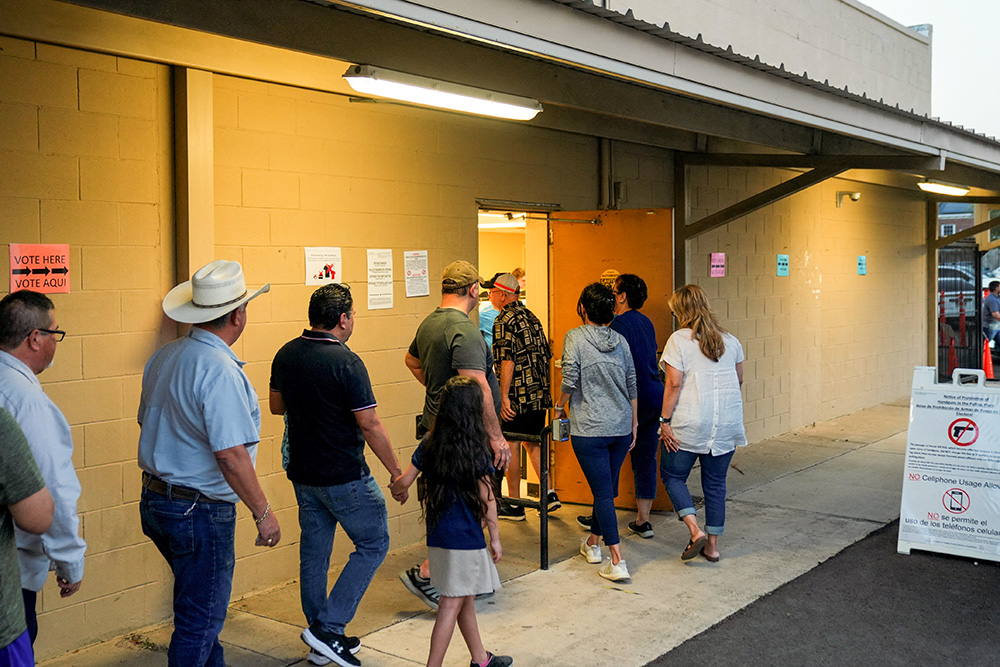
People stand in a line to vote shortly before the polls close in Edinburg, Texas, during the Super Tuesday primary election March 5. (OSV News/Reuters/Cheney Orr)
Trying to figure out the currents and eddies in the estuary where politics and religion collide? Welcome to the club.
This week, a couple of readers wrote to me about Jesuit Fr. Thomas Reese's article analyzing the Catholic vote in the 2024 election. The headline stated, provocatively, "Catholics could decide the 2024 election." It was a fine and balanced piece that echoed a 2020 piece in The Washington Post by E.J. Dionne, "There Is No 'Catholic Vote.' And Yet, It Matters," and countless columns I have published through the years.
The thesis is simple. Unlike other religious groups that align disproportionately with one party or the other, Catholics straddle the electorate. In the 2020 election, exit polls indicated that Donald Trump won white evangelical Christians with 80% of their vote, but he bested Joe Biden among Catholics nationwide by a mere 50% to 49%.
The thesis, however, needs important updating. First, Catholics are disproportionately represented in some key swing states like Arizona, Michigan, Nevada and Pennsylvania, but Latino Catholics constitute a majority of Catholic voters in Arizona and Nevada while white Catholics are dominant among Catholics in the Great Lakes swing states.
So, it is now necessary to put the noun into the plural: There are two "Catholic votes." Latino Catholics have remained more loyal to Democrats than their white counterparts. Those same exit polls from 2020 found Trump winning 57% of white Catholics while Biden won 67% of Hispanic Catholics.
Further, what was once true of the Catholic vote might now be true of the Latino vote: They could prove decisive. As I pointed out in 2021, Trump's ability to overperform among Latinos in 2020, compared to his dismal showing in 2016, may not have been enough to win reelection, but if Democrats do not find a way to stop losing Latino voters, their future is a lot less viable.
Advertisement
The second amendment of the thesis is this: When elections are this close, almost any group appears decisive. Remember that despite Biden's overwhelming margin in the popular vote, and in the Electoral College, if Trump had been able to flip 42,921 votes in three states — in Arizona (10,457), Georgia (11,779) and Wisconsin (20,682) — Trump would have remained president. It is an astonishingly low number when you consider that more than 158 million people voted in 2020.
So, of course Catholics were decisive. So, too, were Black Protestants in Georgia and Ukrainian Orthodox in Wisconsin and Native Americans in Arizona. And, with elections this close, the votes of those with kitchens painted purple might have been decisive too in any given state as well.
What is a mistake, for either party, but especially for Democrats, is to view demographic issues as a zero-sum game. For the Dems, does outreach to religious voters harm the party's prospects with nonreligious voters? Shadi Hamid noted in The Washington Post: "Now that White evangelicals are so disproportionally and unapologetically Trump-supporting, the share of Democrats who view Christianity negatively is likely to remain high or perhaps even increase."
Hamid was quick to point out that this is not a foregone conclusion. "In the pre-Trump era, Democratic presidential candidates took seriously the task of reaching out to devout Christians and presenting their party as hospitable to people of faith," he writes. "The Hillary Clinton campaign, on the other hand, made a conscious decision to de-prioritize outreach to evangelicals."
Hamid quotes Barack Obama's faith-based outreach director Michael Wear, who now leads the Center for Christianity and Public Life: "The simple difference between Obama's two presidential campaigns and Clinton's 2016 campaign is that Obama asked for the votes of White evangelicals and Clinton did not."
Just as the technological worldview has led the planet to the brink of ecological catastrophe, the professionalization and application of technological models to the task of campaigning has led the country to the brink of a democratic catastrophe. We slice and dice the electorate as if we were pitching restaurants or selling laundry detergent. Powerful cultural forces encourage this disaggregation of the electorate.
There are lessons in all this not only for politicians and political theorists, but for religious leaders as well. How can our churches become creators of solidarity? How can they resist the false allure of identity politics on both the left and the right?








